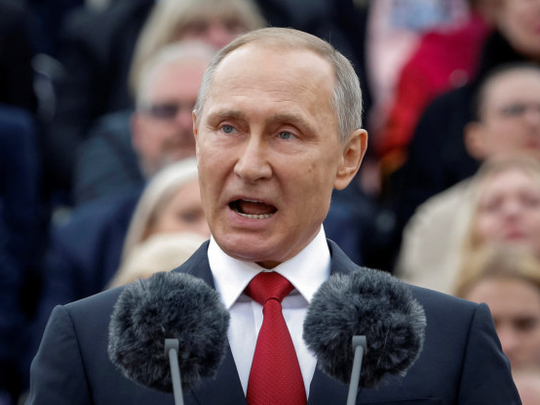
Whether Iran has discretely opened up to Israel over issues of strategic significance to both countries remains difficult to establish. But under the current upheaval and unprecedentedly fast-moving situation in the Middle East, nothing is impossible.
Few new alliances have recently taken shape in the region, which were totally unimaginable even a short while ago. On the one hand, Russia is getting ever so close to Iran, Israel and Turkey. On the other, Turkey is quickly normalising relations with Israel and enhancing its ties with Iran. These new trends in regional relations reflect the immediate needs of each of these countries as they provide each other with a sense of joint security and common interest.
These new developments allow both Iran and Israel convenient conduits to exchange their views through the numerous corridors that are being provided by Russia and Turkey. At the end of the day, nothing is forbidden in politics when it comes to vital national interests. Each country’s own interests always come first and matters of principle have taken subsidiary positions throughout history. And the Middle East is no exception to that.
The Middle East has never seen, since the demise of the Ottoman Empire almost a century ago, anything similar to what it is currently experiencing. The region has thoroughly been subjected to many substantial changes since then, whether under the western, colonial rule of France and Britain or the widely destructive era of the Cold War. The creation of Israel and the four Arab-Israel wars that followed and the mushrooming of dictatorships in the region have all deeply contributed towards a widely impoverished region, withholding it from any meaningful progress.
But sadly, the Middle East is now passing through a new phase as what was deemed impossible has horribly become possible in a world that clearly lacks basic human care, let alone political morality. Under these circumstances, some new dynamics are visible as the process of restructuring and realignment of alliances and understandings reflect new realities.
It may be too early for any publicly-declared arrangement between Tehran and Tel Aviv regarding their common interests in the region. But security is always a priority that can be bring the Arabs’ non-Arab neighbours — namely Israel, Iran and Turkey — ever closer to each other to plan things afresh.
These countries, as well as Russia, are in unison when it comes to, for instance, fighting ‘terrorism’, even though each country has its own interpretation of ‘terrorism’ as well as its own ‘terrorists’ to fight. Yes, the declared official target is to eliminate Daesh (the self-declared Islamic state of Iraq and the Levant), but each has its own enemy to deal with. For Turkey, its main ‘terrorists’ are the Kurdish factions, while for Iran and Russia, their ‘terrorists’ are all those who are opposed to Syrian President Bashar Al Assad. Meanwhile, Israel is only pleased to see its Arab enemies getting weaker by the day.
Therefore, what brings these countries closer to each other is much more important than what separates them. In the forefront of these reasons is the much required security arrangements needed to be adopted in view of the colossal geopolitical changes that are currently taking place in the region. Israel — as a key country in collecting information and possessing major spying centres covering huge geographic areas, stretching from Europe to Asia and from the Gulf to North Africa — is an indispensable partner when it comes to exchanging data.
It is commonly known that mutual interests can turn yesterday’s enemies to today’s friends. However, it has already been established that Iran had secretly entered into dialogue with the United States in Oman over their bilateral relation well before it officially and directly began discussions with the P5+1 (US, France, Britain, China, Russia plus Germany) over its nuclear programme.
Therefore, those who begin dialogue with the “Great Satan” would not necessarily find it embarrassingly difficult to speak to the “Lesser” ones. Additionally, Iran, Washington’s fiercest enemy since the establishment of the Islamic Republic in 1979, gradually turned into an American necessity more than four years ago. Tehran offered Washington with the golden opportunity of filling the political and security vacuum following US withdrawal from Iraq.
At the same time, Iran’s newly-established friendship with Russia has recently allowed Moscow to display its air power, by using the Nojeh air base in Iran’s southern region of Hamedan, to launch attacks against targets belonging to Al Assad’s opponents in Syria, particularly in the city of Aleppo.
Interestingly, Russian President Vladimir Putin has held three meetings this year with Israeli Prime Minister Benjamin Netanyahu, while the latter met the American president, Barack Obama, only once during the same period. Putin and Netanyahu’s discussions have concentrated on wide-ranging and detailed issues and have “left no stone unturned”, according to the Israeli media, in order for them to reach at a vital understanding over issues of mutual interest in the region.
It is quite plausible that Moscow, as a new partner of Tehran, has become the natural corridor between Iran and Israel over their current objectives in the region. It should therefore come as no surprise to anyone that Turkey, Israel and Iran are probably working closely together to keep Arabs as far away as possible from the decision-making process as long as they can — be it in Iraq or Syria.
Mustapha Karkouti is a former president of the Foreign Press Association, London. You can follow him on Twitter at www.twitter.com/@mustaphatache










